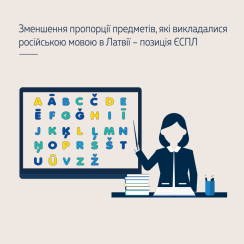Contact center of the Ukrainian Judiciary 044 207-35-46

The adoption of legislative amendments to increase the proportion of subjects taught in state schools only in the state language of Latvia and, consequently, to reduce the proportion of teaching in Russian, does not constitute a violation of Article 2 of Protocol 1 to the Convention for the Protection of Human Rights and Fundamental Freedoms (right to education), as these conventional provisions guarantee the right to education in one of the official languages of the country concerned and do not provide for the right to access education in any language of choice.
The position was formulated by the European Court of Human Rights in the case of VALIULLINA AND OTHERS v. Latvia (no. 56928/19 and 2 others).
In the circumstances of the case, the applicants, parents and children belonging to the Russian-speaking minority in Latvia, relying on Article 2 of Protocol No. 1 to the Convention, alone and in conjunction with Article 14 of the Convention, complained that legislative changes in 2018 had significantly restricted the use of their mother tongue (Russian) in the process of obtaining education in Latvian public schools.
When considering this case, the ECtHR, inter alia, found that the provisions of the Convention to which the applicants referred in their complaints did not guarantee children or their parents the right to be taught in the language of their choice. Their purpose is to ensure that each Contracting Party guarantees the right to education to everyone within its jurisdiction without discrimination on grounds, for example, of language.
In assessing the legitimacy of the objectives pursued by the 2018 legislative amendments, the ECtHR took into account, in particular, the historical factors that led to a significant restriction of the use of the Latvian language - one of the main constitutional values of the State - for more than 50 years during the illegal occupation and annexation of Latvia by the Soviet regime, when the Russian language was imposed in many areas of everyday life. The ECtHR recognised that the need to protect and strengthen the Latvian language was one of the legitimate aims pursued in this case.
After regaining its independence, Latvia gradually began to implement educational reforms aimed at restoring the use of Latvian as the sole language of instruction in schools, but the respondent State did not exceed its discretion in implementing the contested measures and preserved the opportunity for Russian-speaking students to learn their language and preserve their culture and identity. The state has established an education system in the official state language, while ensuring the use of minority languages in varying proportions depending on the school and grade level of the student.
In the end, the ECtHR ruled that the measures to extend the use of Latvian as the language of instruction in the education system were duly justified and proportionate, and that the challenged difference in treatment between Russian and Latvian-speaking students was consistent with the legitimate aims pursued and did not constitute discrimination on grounds of language, and that there was therefore no violation of Article 14 of the Convention (prohibition of discrimination) in conjunction with Article 2 of Protocol No. 1 to the Convention (right to education).
A more detailed description of this judgment will be available in the next ECtHR case law review, while the previous review is available at https://is.gd/lXvEuk. The official text of the judgment VALIULLINA AND OTHERS v. Latvia is available on the ECtHR website at https://hudoc.echr.coe.int/eng?i=001-226485.